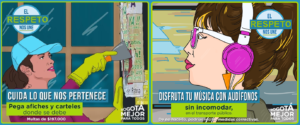Can a society progress when cheating and a lack of civility are this common?
They can’t seem to be able to form lines properly. Not one of them knows how to pay attention to detail. Too many lower class ones over the age of 35 has a shitty, jailhouse tattoo on their hand, and too often it’s a swastika juxtaposed against brown skin. They can’t seem to build infrastructure that doesn’t crumble to bits, or plant a tree near a sidewalk without the roots uplifting the pavement around it. They have no sense of spatial awareness, common decency, or common sense.
The have a benign, matter-of-fact racism the richer and whiter they are. They don’t look where they’re going in the street – they’re too engrossed in their phones, and when they bump into you, it’s your fault. They stop anywhere they like; it doesn’t occur to them to get out of the way. They treat the world around them as if they were the only ones who are there, and have zero consideration for others. Rather than walking in a straight line, they move like chess pieces. Yet despite all this, they are also devoid of ill intent; none of it is conscious. It could be out of selfishness, or they’re just being what we might call “aggressively absent minded,” or both.
You can’t trust anyone. They cut each other’s throats, and they’d cut yours if they could. Everyone steals because everyone has been stolen from.
***
Just before the busy season, a few people in my office got together and created a self-service canteen in the break room, complete with fruit, snacks, coffee and juice – all the stuff that one might find at a corner tienda. On one wall in the break room is a giant whiteboard which you can write on with erasable sharpies. On this board, the cost of each item for sale was listed, and the prices were perfectly reasonable, well below what those items would cost at the corner shop.
The office tienda was based on the honor system, and in case someone wasn’t familiar with what honor was, a company-wide email went out explaining it. If you wanted a snack or drink, then you would take the thing you wanted from the fridge, and put the money it cost in a box in the cupboard. Simple. If you were hungry or thirsty but didn’t have any money on you – no problem – there was a little notepad and pen next to the money box where you could write down what you took and what you owed.
As I always seemed to have a pocket full of change on me, this was never an issue. I would take a snack and faithfully drop what it cost into the box, then and there. But others were not so respectful of the honor system. At the end of the first month, the organizers posted the total debt on the wall – 200,000 pesos – and sent around an email reminding those who hadn’t done so to settle up their outstanding debts. But too few people did, and the tienda, which was never intended to make a profit anyway – merely to provide a service to people – began operating at a loss.
Things only got worse. Not only did people not bother paying their preexisting debts, they also started taking snacks/drinks without writing down what they had taken in the little notebook, essentially stealing, or otherwise “forgetting” to pay, making the honor system anything but honorable. The total outstanding debts grew: 500,000, 850,000, one-million-plus pesos, and were rounded off. As the de facto looting became more and more common, the official deficits had to be approximated. An exact tally became impossible – people just took stuff and didn’t incriminate themselves by writing it down as they were supposed to.
The office tienda was shut down after five months, the total outstanding debts surpassed two million pesos. When I told this little anecdote to a friend of mine who has a Colombian wife, he laughed. He said the first time he had brought her back to his home country to meet his family, she was amazed by the concept of take-a-penny, leave-a-penny at convenience stores. “Why wouldn’t someone just take it all?” she wondered.
‘Que Dios Te Paga’
I pondered this aspect of Colombian culture for a while. The people in my office are not lower-class thieves, drug addicts or ñeros. Far from it. They are quite the opposite, actually. They are the cream of the crop, you could say. They are highly educated, all with varying levels of proficiency in English, French, German and other languages. They could afford to travel regularly to other countries for business or leisure. If these Colombians can’t make the honor system work, I thought, what chance does the country have in developing some kind of common-sense civility? I couldn’t help but to dwell on this: are Colombians capable of doing the right thing? Or has their country been so ruptured for so long that stealing and generally screwing each other over whenever possible has become so ingrained that even the best among them will take advantage if they know they’ll get away with it?
A toxic byproduct of their broken culture can be distilled to a piece of folk wisdom every Colombian proudly declares: ‘no dar papaya’, or ‘don’t give papaya.’ It’s a victim-blaming axiom that essentially means – if you let your guard down and you get scammed or robbed or otherwise cheated, then it’s your own fault.
Another doozy I’ve read about and subsequently heard used in the street is ‘Que Dios te paga’ or ‘May God pay you.’ It is used when someone has loaned money to a friend, and the person in debt has no intention of paying back the money. It’s a polite way of saying to the person who lent you that they’re not going to see it again. “May God pay you back.” I wonder how many of my dishonest coworkers muttered this phrase as they helped themselves repeatedly to the snacks in the now-defunct break room tienda. One thing that I have no doubt about: they didn’t give a shit that they were ruining it for the rest of us.
***
There are a couple of central questions that must be asked here. And the responses to them must be brutally honest. There needs to be critique and criticism and debate instead of knee-jerk indignation. And they are: Can a culture advance, can a society progress, when so many of its people are this selfish, this clueless, this deceitful? When common sense, brotherly civility and an aversion to cheating are such alien concepts?
This is not your typical gringo-rage, that boring fallacy that some people who haven’t been here too long tend to do: judge the country by the first-world standards they feel they’re entitled to. Colombians themselves are aware of their collective shortcomings and are ashamed that the rest of them are like that (the implication being that they are not).
An admission that Colombians are unable to behave themselves without babying punitive measures in place is no more obvious than in the updates and amendments to Colombia’s Código Nacional de Policía y Convivencia (National Police and Coexistence Code) which came into force on January 30 this year. The new laws give the police the power to dish out fines for such things as pet owners who don’t pick up their doggy’s doo in parks or streets (a 92,000 peso fine), to late-night partyers making excessive noise (a 368,000 peso fine), and, of course, the greatest sin ever witnessed in the history of humankind – public urination – which could cost transgressors a whopping 736,000 peso penalty. Urchins caught entering the TransMilenio bus system without paying, either by jumping the turnstile or by running across the street and entering through the glass doors, will now be sent to some re-education course to what translates to a “co-existence course.” There are a litany of other transgressions and corresponding fines, but why ruin the fun of finding out the hard way by listing all of them here?

As part of the city’s “Respect Unites Us” education campaign, posters placed across Bogota earlier this year outline how people should behave and treat each other, and warned of fines and penalties for not doing so. Above left, city dwellers are urged to resolve their differences with words instead of fighting; above right, Bogotanos who are caught littering face fines, or attend a mandatory civil education course.

Left: Colombians urged not to post up flyers… or be prepared to pay a 197,000 peso fine. Right: The campaign encourages people to listen to music with headphones on buses, or be subjected to “corrective measures.”

Left: People should pay to ride public transit (and not do a ‘colado’, or sneak in to Transmilenio stations, like the youths pictured at the top of this article are doing). Right: Bogotanos will have to shell out 393,000 pesos if they make excessive noise during house parties.
Some blame the educational system for Colombians’ bad behavior. “The code is the confirmation of the failure of the family and school in the correct citizenship education of Colombians. If (those things) could not do the education, it is now up to the state to educate (Colombians) with fines,” columnist Alonso Sanchez wrote in the weekly news magazine Semana in January this year.
Still others say that Colombia’s inconformado culture is a consequence of the country’s half-century-long civil war. With people having to worry about things such as kidnapping, rape, murder and theft and an assortment of other horrific crimes for so long, worrying about points of civility got lost on the average citizen. “Colombians forgot about these day-to-day issues,” Juan David Palacio, a lawyer with Colombia’s National Police and one of the authors of the new rules, was quoted in an Associated Press article as saying. “This code becomes a tool for the stability of peace,” he added.
And then there are those who share this writer’s view when they say it’s not the fault of the family or the education system or the civil war – it is just a fault that resides in Colombians themselves (and as such, maybe blame cannot be assigned). “Colombians always say: ‘People don’t know how to behave. They need to be educated,’” Hugo Acero, a security expert in Bogota, was quoted in the same AP story as saying.
The comical irony of the whole thing, is that the very Colombians who like to talk down their fellow countrymen about not knowing how to behave are the same ones who will stop on a congested sidewalk to read a text message, block an entranceway to make a phone call, and bump into you while walking in a zig-zag pattern staring at their phones. Unfortunately, there are no fines for such indignities.
And despite all this – and despite ourselves – there is something intangible as to why so many of us still love this country and can’t seem to pull ourselves away from it. The purpose of MiKolombia is to understand this paradox, to come to terms with it, and to figure out how to live with this kind of duality.
Does one answer a paradox, or does one solve it?

Journalist. Misfit. Malcontent. Provocateur. Is a better Colombia is possible? We’re starting to have doubts.


You repeatedly made a basic Spanish error in this.
Oh yeah, and all that hypermasculine, authoritarian machismo doesn’t help tame egos either…
I think the answer is less complex than we can imagine:
Capitalism breeds a narcissstic culture.
The US basically took over Colombia and shoved its brand of capitalism up its ass.
Now people are always on the lookout for I>society.
It’s not that different anywhere else where people are locked in a rat race trying to out-own each other with shiny objects and the like.
Incredible that someone write “that thing happen in other countrys too” or “if you dont like, leave the country”, this people are the ones that accept the cheating as natural.
The thinking of “we are not bad because there are worst places” is the governing equation in colombian mind.
The problem is the lack of self-criticism. Everyone sees the other’s mistakes but not their own.
As a foreigner living here for the better part of a decade, I have to agree with Claudia´s comment above. If you don´t like it, then surely just move on. It isn´t a given right to come to a country and criticise it and imply that there is something biologically dishonest about Colombian people. As the parent of a Colombian child, I´d take offence to that because it is just xenophobic. This doesn´t mean that I don´t find things like people´s strange walking habits or not paying the public transport annoying, but these are not problems unique to Colombia and I don´t think you´re solving anything much with this piece.
Great text. Just one clarification: you’re actually referring to the National Police Code (‘Código Nacional de Policía y Convivencia, Ley 1801 de 2016), which is NOT the same as the Colombian Civil Code (‘Código Civil’, Ley 14 de 1873 (!!!)).
Yes. I agree. Colombia is a failed, traumatized, mal-functioning society. The problem is off course in the culture, and in the way power relations are built, but the problem is also rooted in the deeper level -anthropologically speaking- of how parenthood, motherhood, infancy, etc are understood and practiced.
Does the author feel that these acts of uncivility are exclusive to Colombia, though? It’s not to deny they exist, but surely all cultures have their own manifestations of rudeness and ignorance. I agree with previous commenters above: when you use such blanket language as ‘all’ and ‘every’ then your arguments as a cultural analyst loose weight. Also, what are you suggesting be the objective? Do you want to create a Scandanavian type utopia in South America?
I think you are getting a lot of the things wrong in terms of the colombian culture. Some ofbthe facts you mention are right but not well explained and that makes things so confusing that at some point when I was reading I just thought that the best thing for you is to leave a country where you don’t feel comfortable!
Will be great if you do some more research and start writing clear.
“If you don’t like it, leave.” That is the perfect Colombian response which demonstrates why, as the author questions, the country won’t improve.
Interesting article and many good points. However, when I have heard Colombians say “Dios te paga” it typically seems to be in response to an act of charity, e.g. if you give a homeless guy 500 pesos. The thinking being that as the recipient himself cannot contribute in kind, God will settle the imbalance. Another saying is “el vivo vive del bobo” which means the shrewd person lives off the naive, innocent one. There’s also “el que se enamore pierde”, he who falls in love loses. And “hecho la ley, hecho la trampa” which means when a law is made, people already know how to break it with impunity.
In my work experience the office honor system never works–at least in the States. Perhaps 30 years ago. Why not simply provide free snacks and services to your employees like nearly every modern office — Google, Facebook, law firms, NGOs. ROI of employee appreciation is far greater than a few million pesos over several months? Understand your gripe and cultural challenges faced in Colombia, but I don’t feel like the example you’ve used is a Colombian-specific issue–it happens everywhere.
I’m Colombian and I must sadly agree with a lot of things that the articles points. However, the use of universal words like “all” “every” reduces the credibility of the article. I think the way out of this is leading by example and getting rid of the “el vivo vive del bobo” attitude.
this has been an excellent outlook on the colombian culture. the “care-free” approach is more harmful than anything. I have often bumped into dead ends at work just to hear the superiors saying “take it easy, relax, don’t worry..”
the answer is not education, because even the people in best schools and universities are the same when they are tested against civility. I believe it is the bandwagon effect of people in colombia following the first-world ideology in a third world framework. high income inequality has also alienated them with the common masses. they can turn a blind eye to social issues just because they can send their children to private schools and universities or live in a posh building just two blocks away from a slum.
this article was an eye opener. unfortunately it would not dent the high horse these colombians sit upon.
I have only lived here 4 years and I am still in shock, daily, about the rude selfisch behaviour of most. A specialized security cam ‘friend’ for whom I hurried home not turning up, sending a message next morning ‘sorry I had an emergency’, not having the decency to send that same message an hour before the scheduled meeting. On and on it goes. This society could be ‘rich’ but chooses to be poor, drink too much and listen to music that is too loud.